
Irving Berlin was an American composer and songwriter. His music forms a large part of the Great American Songbook. Berlin received numerous honors including an Academy Award, a Grammy Award, and a Tony Award. He also received the Presidential Medal of Freedom from President Gerald R. Ford in 1977. Broadcast journalist Walter Cronkite stated he "helped write the story of this country, capturing the best of who we are and the dreams that shape our lives".
This is a list of notable events in music that took place in the year 1918.
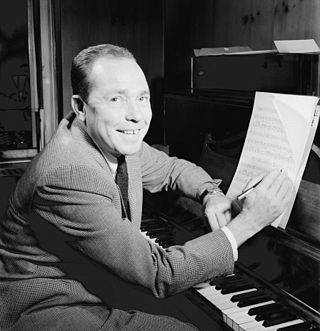
John Herndon Mercer was an American lyricist, songwriter, and singer, as well as a record label executive who co-founded Capitol Records with music industry businessmen Buddy DeSylva and Glenn E. Wallichs.

Jean Schwartz was a Hungarian-born Jewish American composer and pianist. He is best known for his work writing the scores for more than 30 Broadway musicals, and for his creation of more than 1,000 popular songs with the lyricist William Jerome. Schwartz and Jerome also performed together on the vaudeville stage in the United States; sometimes in collaboration with Maude Nugent, Jerome's wife, and the Dolly Sisters. Schwartz was married to Jenny Dolly from 1913 to 1921.

Dorothy Fields was an American librettist and lyricist. She wrote more than 400 songs for Broadway musicals and films. Her best-known pieces include "The Way You Look Tonight" (1936), "A Fine Romance" (1936), "On the Sunny Side of the Street" (1930), "Don't Blame Me" (1948), "Pick Yourself Up" (1936), "I'm in the Mood for Love" (1935), "You Couldn't Be Cuter" (1938) and "Big Spender" (1966). Throughout her career, she collaborated with various influential figures in the American musical theater, including Jerome Kern, Cy Coleman, Irving Berlin, and Jimmy McHugh. Along with Ann Ronell, Dana Suesse, Bernice Petkere, and Kay Swift, she was one of the first successful Tin Pan Alley and Hollywood female songwriters.
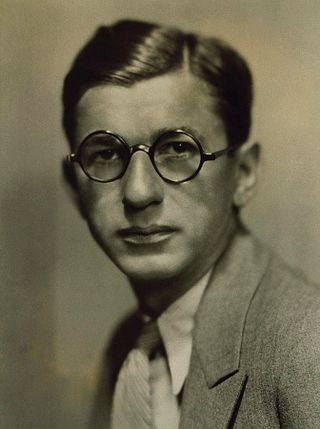
Irving Caesar was an American lyricist and theater composer who wrote lyrics for numerous song standards, including "Swanee", "Sometimes I'm Happy", "Crazy Rhythm", and "Tea for Two", one of the most frequently recorded tunes ever written. In 1972, he was inducted into the Songwriters Hall of Fame.

Blue Skies is a 1946 American musical comedy film directed by Stuart Heisler and starring Bing Crosby, Fred Astaire, and Joan Caulfield. Based on a story by Irving Berlin, the film is about a dancer who loves a showgirl who loves a compulsive nightclub-opener who can't stay committed to anything in life for very long. Produced by Sol C. Siegel, Blue Skies was filmed in Technicolor and released by Paramount Pictures. The music, lyrics, and story were written by Irving Berlin, with most of the songs recycled from earlier works.
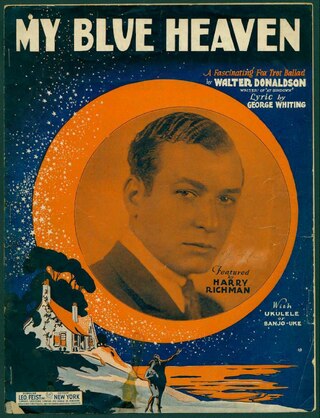
"My Blue Heaven" is a popular song written by Walter Donaldson with lyrics by George A. Whiting. The song was used in the Ziegfeld Follies of 1927. It has become part of various fake book collections. Its musical composition entered the public domain on January 1, 2023.
Louis Achille Hirsch, also known as Louis A. Hirsch and Lou Hirsch, was an American composer of songs and musicals in the early 20th century.
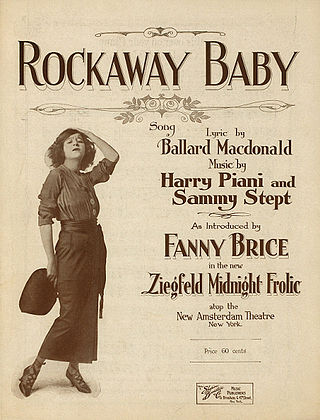
Samuel Howard Stept was an American songwriter who wrote for Broadway, Hollywood and the big bands. He became known simply as Sam Stept or Sam H. Stept – he rarely used his full middle name.
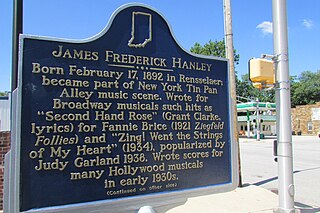
James Frederick Hanley was an American songwriter and author.
Philip George Furia was an American author and English literature professor. His books focus on the lyricists of the Tin Pan Alley era.

"When I Lost You" is a song with music and lyrics by Irving Berlin. It was written in 1912 after his wife of five months, the former Dorothy Goetz, died of typhoid fever. In it he poured out the grief of his loss; it was the only song that he ever admitted had such a connection to his own life. The song, a ballad, was unlike any of Berlin's previous songs, which were upbeat tunes written to take advantage of the dance craze. The song is in a slow waltz tempo. It became Berlin's first hit ballad.
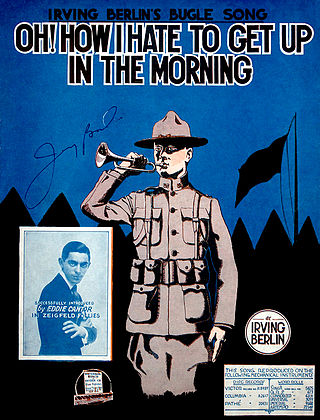
"Oh! How I Hate to Get Up in the Morning" is a song written by Irving Berlin in 1918 that gives a comic perspective on military life. Berlin composed the song as an expression of protest against the indignities of Army routine shortly after being drafted into the United States Army in 1918. The song soon made the rounds of camp and became popular with other soldiers, partly because hatred of reveille was universal.
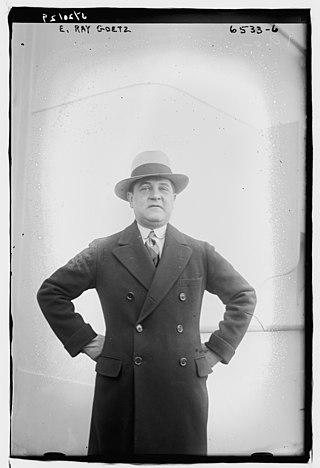
Edward Ray Goetz was an American composer, lyricist, playwright, theatre director, and theatrical producer. A Tin Pan Alley songwriter, he published more than 500 songs during his career, many of them originally written for the New York stage. His songs were recorded by several artists, including Judy Garland, Al Jolson, and Blossom Seeley. He was active as both a lyricist and composer for Broadway musicals from 1906 through to 1930, collaborating with artists like George Gershwin, Cole Porter, Sigmund Romberg, and A. Baldwin Sloane to create material for the theatre.
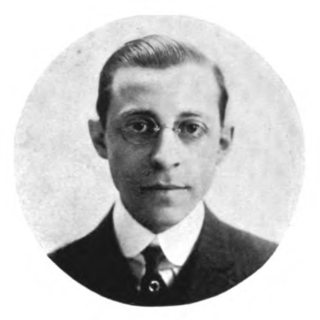
David Stamper was an American songwriter of the Tin Pan Alley and vaudeville eras, a contributor to twenty-one editions of the Ziegfeld Follies, writer for the Fox Film Corporation, and composer of more than one thousand songs, in spite of never learning to read or write traditional music notation. He may have written "Shine On Harvest Moon", a claim supported by vaudeville performer and writer Eddie Cantor. He was also a charter member of the American Society of Composers, Authors and Publishers or ASCAP.
George William Meyer was an American Tin Pan Alley songwriter. He was born in Boston, Massachusetts, in 1884. He graduated from Roxbury High School, and began working in accountancy for Boston department stores, before moving to New York City in his mid-20s.

"A Pretty Girl Is Like A Melody" is a popular song written by Irving Berlin in 1919 which became the theme song of the Ziegfeld Follies. The first verse and refrain are considered part of the Great American Songbook and are often covered as a jazz standard.
Clifford Hess, better known as Cliff Hess was an American songwriter, composer, lyricist, and pianist. He began his career as pianist while a young teenager working on passenger riverboats on the Mississippi River. He met Irving Berlin while working in the Chicago branch of the music publisher Waterson, Berlin & Snyder, Inc.. By 1911 he was working as Berlin's secretary, and appeared on Broadway that year with Berlin as his accompanist in performances of his songs. He served as Berlin's secretary until 1918 and was largely responsible for not only notating Berlin's songs into sheet music, but also editing his works into playable keys and simplifying works to make them accessible for commercial sale. After leaving Berlin, he became a successful songwriter in his own right with many tunes being recorded for Victor Records and Columbia Records. He also wrote songs for films during the 1930s and some of his tunes were interpolated into musicals.




























